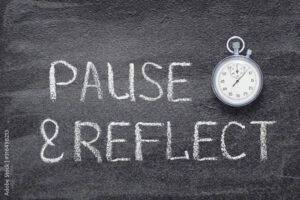 In our final debate, Jenna and Vanessa took on Brianne and Rose tackling the topic: Schools should continue to teach skills that can be easily carried out by technology (e.g., cursive writing, multiplication tables, spelling).
In our final debate, Jenna and Vanessa took on Brianne and Rose tackling the topic: Schools should continue to teach skills that can be easily carried out by technology (e.g., cursive writing, multiplication tables, spelling).
The pre-vote was an overwhelming YES to this statement with 85% voting agree, versus the 15% disagree. As the open debate began, it turns out that feelings on this statement were a bit more fluid than the vote displayed. I was excited for this debate, especially following the heavy debate on equitable technology use (brain still hurts from that one), as this debate topic felt more concrete, practical, and something I could really resonate with. As an educator, I actually grapple with this issue often in my practice; I am ‘guilty’ (should I feel guilty?!) of administering weekly spelling tests, offering handwriting worksheets and encouraging multiplication tables memorization, among other (perhaps) ‘outdated’ skills.
 This debate allowed me to reflect on my own practice and question some of my instructional and content choices. With SO MUCH to teach, and SO LITTLE time, prioritizing skills our students need is important. So…what skills are worthy of our time? Do technology skills need to replace some of the ‘classics’? Is there room for both (somehow…)? Even though many skills can be carried out by tech, shouldn’t students have some of these competencies (in spelling, basic math facts, etc.)? With technology taking over, are we doing a disservice not putting more emphasis on digital skills? So many questions and only one little blog post to (attempt to) hash it out…let’s go!
This debate allowed me to reflect on my own practice and question some of my instructional and content choices. With SO MUCH to teach, and SO LITTLE time, prioritizing skills our students need is important. So…what skills are worthy of our time? Do technology skills need to replace some of the ‘classics’? Is there room for both (somehow…)? Even though many skills can be carried out by tech, shouldn’t students have some of these competencies (in spelling, basic math facts, etc.)? With technology taking over, are we doing a disservice not putting more emphasis on digital skills? So many questions and only one little blog post to (attempt to) hash it out…let’s go!
Outdated, shm-outdated: these skills matter!
Jenna and Vanessa presented a strong case for the agree side! They argued that technology is a tool but not a replacement to foundational skills that help students with their overall learning development; they point out the correlation of spelling instruction to overall literacy development, helping with early reading and writing. As well, multiplication tables are important in basic numeracy development and in fostering lifelong Math confidence and real world application of these numeracy facts. Traditional skills help students with successful technology use (later on) too; for example, if a student has no concept of basic spelling, spell check can’t prompt them with a correction, or if a student is working on an online Math program, basic number sense is helpful.
 In the open debate, Carol brought up passive vs. active learning, arguing that pen and paper notes help immensely with information retention. Forcing students to write notes, also forces a level of summary that isn’t required with typed notes. Vanessa discussed how handwriting actually helped her daughter with certain learning challenges. As well, we discussed that a basic understanding of ‘outdated’ skills like handwriting is significant for inclusivity; we need the ability to understand and communicate with older generations that use this. Mike gave the grandma birthday card example and we heard about many teachers who handwrite their notes on the board, or quasi-handwrite like Sheila.
In the open debate, Carol brought up passive vs. active learning, arguing that pen and paper notes help immensely with information retention. Forcing students to write notes, also forces a level of summary that isn’t required with typed notes. Vanessa discussed how handwriting actually helped her daughter with certain learning challenges. As well, we discussed that a basic understanding of ‘outdated’ skills like handwriting is significant for inclusivity; we need the ability to understand and communicate with older generations that use this. Mike gave the grandma birthday card example and we heard about many teachers who handwrite their notes on the board, or quasi-handwrite like Sheila.
Their resources were convincing too. They shared an article that directly ties handwriting to early literacy development, proving the importance of handwriting skills in early years that often (problematically) get replaced with typing skills by the end of grade one. This study talks about the issue of over-reliance on tech and also suggests handwriting is irreplaceable from a convenience standpoint: “[p]ut simply, handwriting is portable and practical: A pencil or pen can be easily carried and used, and they are much less expensive than high-technology devices, such as laptops or tablets. If a pencil tip breaks, then students just need access to a pencil sharpener. If a laptop or tablet breaks? That is a more complicated problem.” This quote also has me pondering the equity side of teaching these skills – ‘outdated skills’ that don’t require tech work for all learners, whereas technology replacements are fantastic…if you have working technology.
 In The Importance of Learning Multiplication – Times Tables for Primary School Children, we read about the benefits of multiplication tables both in school (building block for numeracy) and outside of school (real world applications): “[a] good knowledge of multiplication can give children a sense of independence and teach them to think on their own by reducing over-reliance on technology. It can be considered a form of daily mental training that can considerably improve cognitive functions, boosting your child’s brain power to help them achieve goals and foster long term self-confidence.” Throughout the debate, and in the research, the issue of overreliance was a recurring theme. We want to foster competent technology users, but we don’t want them to rely on technology for, well, everything, as technology can be unreliable.
In The Importance of Learning Multiplication – Times Tables for Primary School Children, we read about the benefits of multiplication tables both in school (building block for numeracy) and outside of school (real world applications): “[a] good knowledge of multiplication can give children a sense of independence and teach them to think on their own by reducing over-reliance on technology. It can be considered a form of daily mental training that can considerably improve cognitive functions, boosting your child’s brain power to help them achieve goals and foster long term self-confidence.” Throughout the debate, and in the research, the issue of overreliance was a recurring theme. We want to foster competent technology users, but we don’t want them to rely on technology for, well, everything, as technology can be unreliable.
Nope – it’s time to re-define education!
 Brianne and Rose argued the disagree side here, but put their own spin on it. While they didn’t fully lobby for anti-handwriting, spelling, or fact memorization, they took the stance of: these ‘outdated’ skills don’t mean an automatic tech replacement, but instead we need to recognize when certain skills are simply outdated. They preached best, informed, current practices over nostalgic methods of rote memorization and worksheets. They promoted more comprehensive skills to replace outdated methods (not necessarily technology), like focusing on well-rounded numeracy skills to replace multiplication mad minutes, or using phonics-based Spelling programs instead of a random list of words to memorize (and promptly forget). Rose offered alternative fine motor activities to replace handwriting, such as basic printing, art, etc.
Brianne and Rose argued the disagree side here, but put their own spin on it. While they didn’t fully lobby for anti-handwriting, spelling, or fact memorization, they took the stance of: these ‘outdated’ skills don’t mean an automatic tech replacement, but instead we need to recognize when certain skills are simply outdated. They preached best, informed, current practices over nostalgic methods of rote memorization and worksheets. They promoted more comprehensive skills to replace outdated methods (not necessarily technology), like focusing on well-rounded numeracy skills to replace multiplication mad minutes, or using phonics-based Spelling programs instead of a random list of words to memorize (and promptly forget). Rose offered alternative fine motor activities to replace handwriting, such as basic printing, art, etc.
I appreciated Kaela’s point in the open debate: she suggests that the reason “I’ve always done it that way” isn’t sufficient and isn’t serving our students, although it is a common sentiment, especially among experienced educators. I am just eight years into my teaching career and can already recognize areas I am feeling comfortable in…perhaps ‘stuck’ in.
 This team also provided ample resources to support technology’s place in the classroom. While they didn’t argue technology as a replacement to other skills, their side of the debate promoted more technology to benefit learners in increased engagement, digital citizenship and real world skills for a tech–driven workforce. In the article Creating Innovators: Why America’s Education System Is Obsolete, we read a compelling case for an educational overhaul, arguing that most educational practices are outdated and that we need to foster innovation in students. It mentions the problematic passivity in education: “[f]or 12 to 16 years, [students] learn to consume information while in school” and suggests that “our schooling culture has actually turned us into the ‘good little consumers’ that we are.” I think all educators would agree that we want stronger critical thinking, independent learners in our classrooms, but, as this article states, perhaps our current practices aren’t allowing students to foster problem solving, creativity or innovation.
This team also provided ample resources to support technology’s place in the classroom. While they didn’t argue technology as a replacement to other skills, their side of the debate promoted more technology to benefit learners in increased engagement, digital citizenship and real world skills for a tech–driven workforce. In the article Creating Innovators: Why America’s Education System Is Obsolete, we read a compelling case for an educational overhaul, arguing that most educational practices are outdated and that we need to foster innovation in students. It mentions the problematic passivity in education: “[f]or 12 to 16 years, [students] learn to consume information while in school” and suggests that “our schooling culture has actually turned us into the ‘good little consumers’ that we are.” I think all educators would agree that we want stronger critical thinking, independent learners in our classrooms, but, as this article states, perhaps our current practices aren’t allowing students to foster problem solving, creativity or innovation.
In conclusion, are we all arguing the same thing??
 At one point, Vanessa said “we’re arguing the same thing here?” The agree team concluded with the importance of these skills as essential building blocks (especially in younger years) that impact overall literacy and numeracy skills. They acknowledge that less emphasis can be placed on these skills, to perhaps allow room for more tech-related ones, but they should not be eliminated. The disagree team asked, are we defending nostalgia or preparing students for the current world? Throughout the debate, both teams acknowledged the purpose of foundational skills that shouldn’t be replaced with tech, like spelling, writing, reading, Math facts, and more, but seemed to agree that these skills need to be taught purposefully and with current, best practices in mind. The lines were a bit murky in the end, but it was a thought-provoking debate that was (for me anyway) a productive interrogation of educational pedagogy!
At one point, Vanessa said “we’re arguing the same thing here?” The agree team concluded with the importance of these skills as essential building blocks (especially in younger years) that impact overall literacy and numeracy skills. They acknowledge that less emphasis can be placed on these skills, to perhaps allow room for more tech-related ones, but they should not be eliminated. The disagree team asked, are we defending nostalgia or preparing students for the current world? Throughout the debate, both teams acknowledged the purpose of foundational skills that shouldn’t be replaced with tech, like spelling, writing, reading, Math facts, and more, but seemed to agree that these skills need to be taught purposefully and with current, best practices in mind. The lines were a bit murky in the end, but it was a thought-provoking debate that was (for me anyway) a productive interrogation of educational pedagogy!
 I feel like I end every blog post saying something about a ‘balance’ and, well sorry but, this one is no different! I ended on the agree side but thought both teams presented compelling cases that promoted a balance as well: maintaining basic skill development in schools (writing, Math, spelling, etc) but with intentional, current educational practices at the forefront. Spelling – but with phonetic focus and the goal of stronger literacy development, handwriting (or even printing) – but with the goal of promoting more active listening/learning and as a lifelong skill needed, and Math facts – with less emphasis on rote memorization and more emphasis on numeracy development and real world applications.
I feel like I end every blog post saying something about a ‘balance’ and, well sorry but, this one is no different! I ended on the agree side but thought both teams presented compelling cases that promoted a balance as well: maintaining basic skill development in schools (writing, Math, spelling, etc) but with intentional, current educational practices at the forefront. Spelling – but with phonetic focus and the goal of stronger literacy development, handwriting (or even printing) – but with the goal of promoting more active listening/learning and as a lifelong skill needed, and Math facts – with less emphasis on rote memorization and more emphasis on numeracy development and real world applications.
Teachers are lifelong learners and interrogating our teaching norms is essential in our work. This debate sparked a challenging conversion on ‘old school’ vs ‘new school’, best, informed practices, and what today’s learners NEED for today’s world. Great topic to end on!
Teagan
6 Comments
Kritika Sehgal
Teagan, I agree with you on keeping traditional skills as part of teaching. I also use spelling tests, handwriting and times tables in my classroom, and I feel these basics are still very important. Even though technology is everywhere now, students need these foundations first. Without them, I see that they struggle more when using technology because they rely on it for answers instead of thinking on their own.
I liked how you mentioned balance. I also believe we can teach both basic skills like writing and math facts, and new skills with technology. These “old” skills build confidence and make students more independent.
This debate really made me feel sure that these skills should not be replaced, but taught in a way that makes sense for today’s students.
Kritika
Teagan Schiltz
Thanks for the comment Kritika. We are on the same page here- balance balance balance! You say it perfectly: “these skills should not be replaced, but taught in a way that makes sense for today’s students.” I completely agree that traditional skills should continue to be taught, but should reflect updated practices rooted in literacy and numeracy development to best support learners, before they begin relying on tech. Thanks!
Teagan
Jessalyn Shwaga
Hi Teagan,
I also rambled a lot on this one. I think Vanessa’s point was what drove it home for me, too. We were all arguing the same thing. None of us believes that students should be simply memorizing; they all need to use critical thinking skills and learn problem-solving. Sometimes these debates are tricky because we get sidetracked. Passive learning can occur regardless of the tools used, whether it be paper and pencil or technology. Especially with students who are apathetic towards school to begin with, why think when you can memorize, regurgitate the information, and then dump it out when it is no longer of use to you? That’s why learning has to be relevant and engaging so students see the importance of understanding what they are learning and see how it applies to life after their formal schooling. If students see that they are learning using tools that are no longer a reality, it automatically decreases their motivation, and they will default back to passive learning. It’s not that the basics or fundamentals are useless, because they aren’t, but kids are smart, and if something isn’t relevant to them, they will see through that. I think that was really key for me in understanding this debate. As much as we see the value in those fundamentals and they need to be taught, the level of perfection in them isn’t as important anymore.
Jenni Peeke
Teagan – no guilt allowed! Teachers have so much to prepare and worry about as it is, without feeling bad about spelling tests and cursive writing to boot. That’s before considering how many school and grade changes we go through — I’m still finding subject areas that I need to brush up on and ‘get with the times.’ Also I do still teach cursive writing, just not to every student (some still need to work on printing legibly!)
But, the fact that you would question feeling guilty means that you’re a teacher who is always evolving and learning and adapting, and that’s the biggest part of this debate in my mind… spelling tests, cursive writing and rote memorization is never going to ‘hurt’ students at the end of the day.
I appreciate your transparency and honesty on this one!!
Leanne Meili
Hi Teagan,
Thank you for sharing!
I am glad you brought up the point about a common phrase we hear in education “I’ve always done it that way”. And I completely agree with you that it is not a valid reason for maintaining outdated practices. If this is the mindset of some teachers, I am curious as to why? Why is there hesitation or resistance for change? Or trying something differently? Do they have the proper support and training to try something new? But if it is working for them, and their students…..do they need to change? So many questions!!
Your point that educators are lifelong learners really resonated with me, and I couldn’t agree more (hence getting my master’s degree after 27 years of teaching!) We owe it to our students to continually reflect, question, and reshape our teaching practices. I mentioned in my final assignment that if I were still teaching the same way I did 27 years ago, I would be considered obsolete and I know I wouldn’t be meeting the needs of my students.
Schools are multigenerational workplaces, made up of both new and seasoned teachers and I don’t believe one is better than the other, but I do believe that with more opportunities for collaboration, we could bridge the generational divide. By working and learning together, educators across all experience levels can better support one another and most importantly, better support our students.
Great post, Teagan!
Teagan Schiltz
Thanks for the reply, Leanne. Yes, you are the definition of a lifelong learner!! You can advocate for the importance of change in education as you’ve seen it evolve and therefore have clearly evolved your practices to meet the changing expectations of the system and meet the (increasingly diverse) needs of your learners. I appreciate your questions around resistance to change…I don’t have answers (haha). But I do think change is scary and it’s often easier and more comfortable to stick with what we know. I can think of times where I have *considered* changing a teaching practice, knowing there is a better option, but shying away from the discomfort (and frankly sometimes the time limit) that comes with change. I think support may also be a factor…if teachers don’t feel supported by their colleagues, or their admin, they will be even more resistant.
Love the idea of MORE collaboration to bridge the generational divide…as there certainly is one in all schools. I am sure you will do incredible in fostering an environment where this open collaboration can occur and in supporting teachers in your new admin role in the Fall – those educators are so lucky to have you to learn from and work with!
Take care,
Teagan